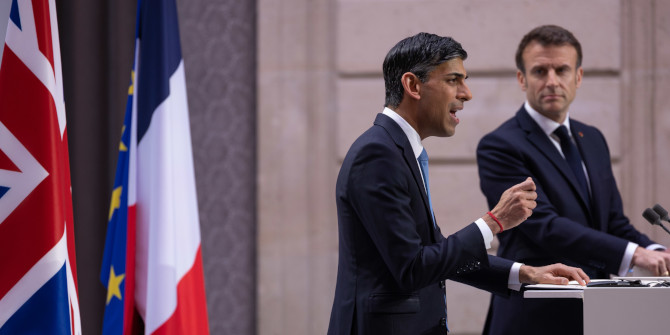Protectionist parties have become increasingly prominent in European politics over the last two decades. But what drives support for these parties? Drawing on a new study, Enrique García-Viñuela, Nicolas Motz and Pedro Riera find that those with lower levels of education, the unemployed and members of trade unions are the most likely to support protectionist parties.
Since the turn of the century, protectionist policies have surged in popularity in western democracies. According to data from the European Social Survey, the vote share of protectionist parties in national elections in EU countries increased from 26 per cent in 2002 to 40 per cent in 2018.
Economic theory views protectionism as potentially beneficial for specific firms and their workers, but harmful to consumers and social welfare overall. Given the possible costs of such policies, it is important to understand what drives voters to lend their support to protectionist parties.
Four hypotheses
In a new study, we examine what drives support for trade protectionist parties. Based on the literature on trade policy and elections, we put forward four hypotheses about the vote for protectionist parties. First, the Stolper-Samuelson model of international trade predicts that workers in advanced industrial economies with lower levels of education will suffer from open trade, while the better-educated are expected to benefit as they are more able to adapt and compete in global markets.
Furthermore, highly-educated voters are more likely to prefer free trade as they have a better understanding of the costs of protectionist policies as well as their long-lasting adverse consequences on social welfare and economic growth. This leads to the hypothesis that protectionist parties are more likely to attract the support of voters with lower levels of education.
Second, previous research has found that manufacturing imports from less developed countries dislocate the labour markets of advanced industrial economies, reducing the employment and wages of workers displaced in the import-competing sectors of the economy. If unemployed individuals believe, correctly or not, that restrictive trade policies would reverse those negative effects, they have incentives to vote for parties that propose protectionist measures. This leads to a second hypothesis that unemployed workers are more likely to vote for protectionist parties.
Third, unemployed voters may react differently when there are appropriate social policies to compensate those who have lost their jobs due to globalisation. This is sometimes referred to as the “compensation principle”. This leads to a third hypothesis, that the vote for protectionist parties will be lower when a country’s public sector can reduce the adjustment costs associated with import competition.
Finally, union membership is more prevalent in the sectors more negatively affected by import competition, like textile and steel products. Furthermore, unions typically promote trade protectionist policies in their communications and union members are therefore more exposed to such views. This leads to a final hypothesis that protectionist parties are more likely to receive votes from workers who belong to trade unions.
Measuring protectionism
To test the above hypotheses, we use individual data, party data, and country data. Individual data come from the first nine waves of the European Social Survey, collected every two years during the period 2002-2019. Each country-wave survey contains information about 2,000 respondents meant to be representative of the country’s electorate. Additionally, we obtain party data from the Manifesto Project, while the source for country variables such as unemployment rates and social protection expenditures is Eurostat.
Based on the Manifesto Project data, we assign each party a “protectionism score” according to the relative number of statements favouring or rejecting protectionism in a party’s election manifesto. We then classify a party as protectionist if the party’s score exceeds the median score across all parties that received at least five percent of the vote in the election in question.
To ensure our results are not driven by a different, more salient position that protectionist parties happen to have in common, we also calculate equivalent scores for alternative issues. We find that at best our measure of protectionism correlates weakly with parties’ positions on immigration, nationalism or international cooperation. We also show that the parties we classify as protectionist tend to be located on the political fringes, both on the left and the right.
What drives support for protectionist parties?
Given our classification, we use data from the European Social Survey to investigate the drivers of support for a protectionist party. In line with our hypothesis, we find that voters who support trade protectionist parties are the least educated, tend to be unemployed, and are more likely to be members of trade unions. Unexpectedly, however, using a macro proxy for a country’s compensation potential, we do not find significant evidence that social spending to compensate those who have lost their jobs due to import competition deters support for trade protectionist parties.
How do these findings affect our understanding of the domestic politics of international economic integration? Compared to previous studies that looked at the connection between voters’ characteristics and attitudes towards trade, we find that the same variables also affect the choice to vote for a protectionist party. As a next step, it would be valuable to gain a deeper understanding of voters’ underlying motivations. Do they merely want to put a stop to further liberalisation or do they intend to roll back globalisation?
While our findings regarding the ability of a country’s compensation potential to prevent rising support for protectionism may be a consequence of data limitations, the results in general indicate that past policies have not been sufficient to prevent a backlash against globalisation. Given the welfare gains that can come with increased trade, an important task for future research is to determine which (if any) policies can maintain broad support for free trade.
For more information, see the authors’ accompanying paper at European Union Politics
Note: This article gives the views of the authors, not the position of EUROPP – European Politics and Policy or the London School of Economics. Featured image credit: anandoart / Shutterstock.com





